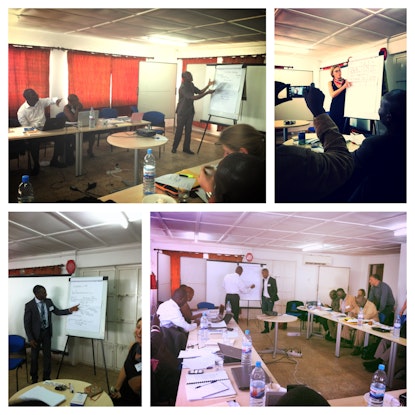The next step after disclosure

Disclosure of contracting information is absolutely crucial—There is no doubt about it. Disclosure is only one part of the story, though. Participation is also critical, and participation around contracting is difficult without a proper understanding of the contract in question and of the contracting process.(e.g. how resource contracts are embedded in the broader legal and developmental framework of a country.)
Open Contracting-Principle 9 reflects exactly that point about participation. It says that, “Governments shall work together with the private sector, donors, and civil society to build the capacities of all relevant stakeholders to understand, monitor and improve public contracting and to create sustainable funding mechanisms to support participatory public contracting.”
To help ensure that citizens can have a proper understanding of contracting processes, the NGO OpenOil, together with the German Federal Ministry for Economic Cooperation and Development through GIZ and ,is currently in the process of developing training modules around extractive resource contracts which then can be adjusted to different settings and target groups.
In November, GIZ together with the World Bank Institute hosted a 2-day pilot training session that took place in Freetown, Sierra Leone with around 20 government participants from Sierra Leone as well as Liberia. Topics included the contracts’ place in the broader legal framework, different forms of contracts, key topics in negotiations, fiscal terms and calculation of ‘government take’ – interwoven with practical examples and exercises.
Within the context of the training, participants also explored entry points for open contracting in the Extractive Industries (EI) sector in Sierra Leone. The Open Contracting session began with a brief overview of Open Contracting, and then participants mapped the entry points for disclosure and participation along the EI contracting cycle in Sierra Leone: Planning, Bidding / Negotiations, Award/Ratification, Performance and Conclusion.
During the session, participants raised and explored issues related to environmental and social impact assessments, commercially sensitive information, community development agreements, existing online technological infrastructure for disclosure, the need to build capacity of civil society and how disclosure of fiscal terms is complementary to the Extractive Industries Transparency Initiative (EITI).
As a result of this pilot training program, next steps include the finalization of the training modules which then can be adjusted to specific contexts, (e.g. country setting or target group).
Open contracting, meaning effective disclosure of contracting information and participation around contracting processes, will help ensure that investment deals are aligned with the public interest so that citizens get the required public services, that public resources are managed efficiently and that companies have a level-playing field. Building the capacity of various actors to engage meaningfully in contracting processes (e.g. by working around contract details like in Sierra Leone as described) is essential if the potential of open contracting is to be realized.
If you would like to know more, please get in touch (Nadine.Stiller@giz.de).